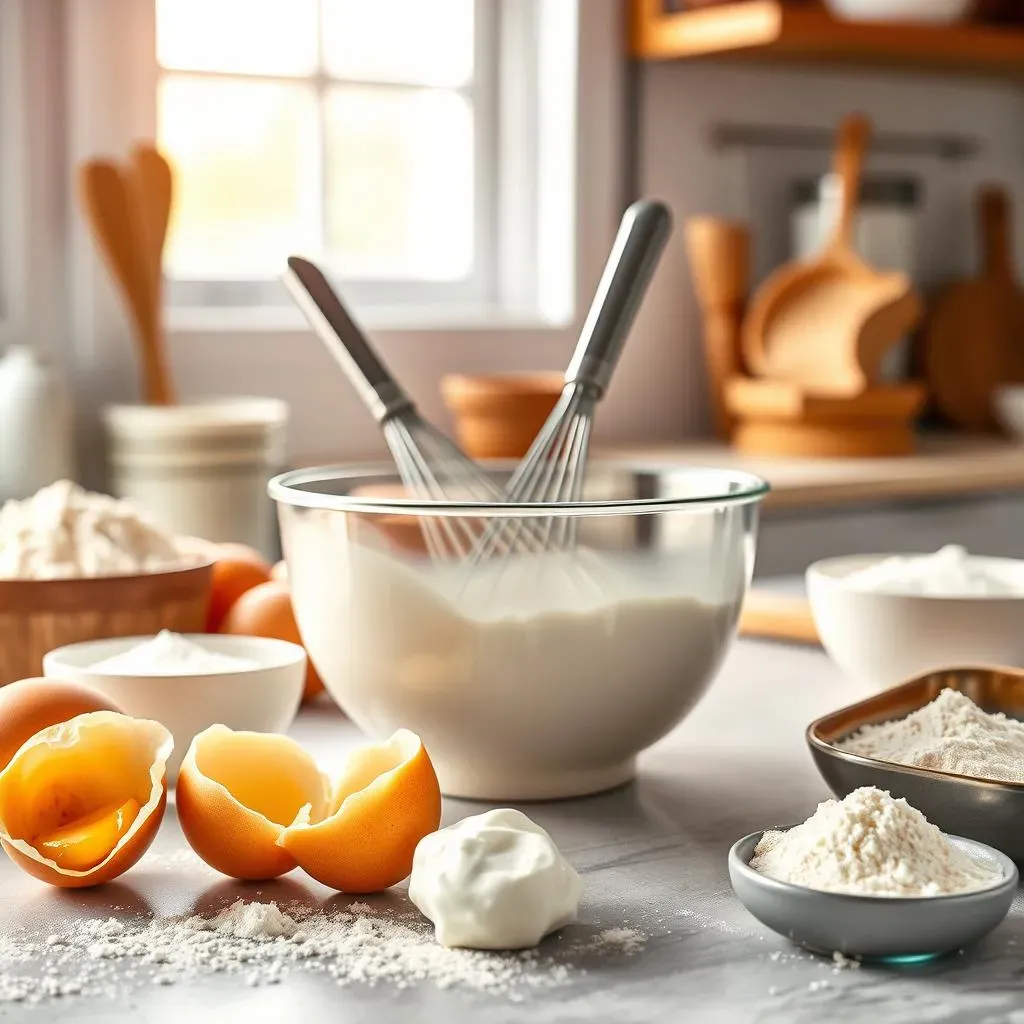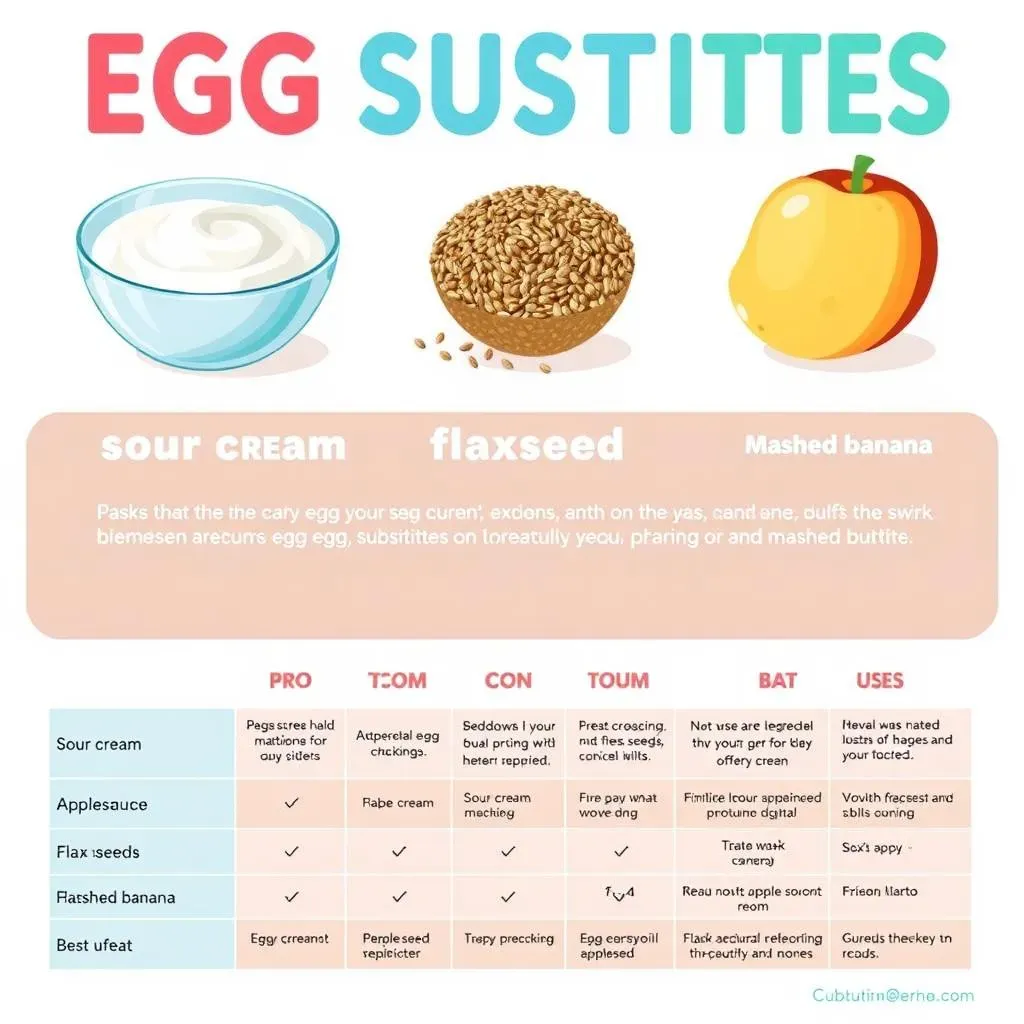Table of Contents
Ever found yourself mid-recipe, only to discover you're out of eggs? It's a baking nightmare, I know! But what if I told you that the creamy tub of sour cream in your fridge could be your secret weapon? Yes, you heard right! We're going to explore the surprisingly effective world of egg substitutes, and specifically, answer the burning question: can you use sour cream as a substitute for eggs? This isn't just about rescuing a recipe; it's about understanding how different ingredients work their magic. We'll go over why some folks avoid eggs, how sour cream steps up to the plate, and how it compares to other options you might have heard about. We will see how to use it in real life baking situations. Get ready to learn some kitchen hacks that will not only save your baking but also expand your culinary horizons. You'll be surprised how this simple swap can change your baking game!
Why Look for Egg Substitutes?

Why Look for Egg Substitutes?
The Egg Allergy Angle
Okay, let's be real, eggs aren't everyone's best friend. For some folks, eggs are a no-go because they trigger allergies. It's not just a mild tummy ache; it can be serious. Imagine trying to enjoy a birthday cake, only to end up with a rash or worse. That's why finding reliable egg substitutes isn't just a trend; it's a necessity for many. We need to have alternatives that allow everyone to enjoy food without worry, and that's where the search for substitutes like sour cream comes in. It's about making sure everyone can have their cake and eat it too, allergy-free!
Beyond allergies, some people choose to avoid eggs for a variety of reasons. Maybe it's a dietary choice, a preference, or a belief. Whatever the reason, it's not my place to judge. What matters is that we respect those choices and try to offer solutions. So, whether you're a vegan, vegetarian, or just trying to cut back on eggs, having a solid list of egg substitutes is a smart idea. Plus, exploring these alternatives can lead to some pretty cool baking discoveries. We might just find that sour cream, or something else entirely, adds a unique twist to our favorite recipes.
Reason for Egg Substitution | Description |
|---|---|
Allergies | Eggs can cause allergic reactions, ranging from mild to severe. |
Dietary Choices | Vegetarians and vegans avoid eggs for ethical or dietary reasons. |
Health Concerns | Some people may avoid eggs due to cholesterol concerns. |
Experimentation | Exploring new baking methods. |
Beyond the Usual Suspects
Let's face it, sometimes you're just out of eggs. It happens to the best of us. You're halfway through a recipe and bam, empty carton. Instead of a mad dash to the store, wouldn't it be great to have a backup plan? That's where knowing about egg substitutes comes in handy. Think of it as a culinary safety net. It's like having a secret weapon in your kitchen, ready to swoop in and save the day (or the cake). The knowledge of how to replace eggs opens up a world of possibilities and gives you the freedom to be spontaneous in your baking.
And hey, maybe you're just curious! Maybe you're wondering what else is out there, beyond the usual egg. That's a great reason to explore egg substitutes too. Trying new things can be fun and educational. It might even lead to you discovering a new favorite ingredient or technique. So, whether you're avoiding eggs for a specific reason or just want to be adventurous, knowing your options is always a good idea. Who knows, you might just become an egg-substitute expert!
Sour Cream as an Egg Substitute: How and Why It Works

Sour Cream as an Egg Substitute: How and Why It Works
Alright, so you're wondering how sour cream, of all things, can possibly stand in for an egg? It might seem strange at first, but it's all about understanding what eggs actually do in a recipe. Eggs are like the glue and the puff in baking. They bind ingredients together, add moisture, and create that lovely light texture we all crave. Now, sour cream, with its tangy flavor and creamy texture, can actually mimic some of those key functions. It's got moisture, it’s got a good amount of fat which helps with tenderness, and it can bind ingredients together too, though not quite as strongly as eggs, so it's not a perfect 1:1 swap for everything.
Think of it this way: eggs are like the main character in a baking drama, but sometimes sour cream can be a pretty good understudy. Sour cream brings its own unique qualities to the mix, adding a subtle tang that can complement certain flavors. It's not going to make your meringue rise, but for things like cakes, cookies, and quick breads, it can work pretty well. It's like that friend who's always there to help out, even if they're not exactly the star of the show. It's all about finding the right recipe and understanding how each ingredient plays its part. So, sour cream isn't just a random substitute; it's a clever way to add moisture and a bit of binding power when you're in a pinch.
Egg Function in Baking | How Sour Cream Substitutes |
|---|---|
Binding | Sour cream helps hold ingredients together, though not as strong as eggs. |
Moisture | Sour cream provides moisture, making baked goods tender. |
Leavening | Sour cream doesn't leaven, so other leavening agents may be needed. |
Texture | Sour cream adds a creamy texture and a slight tang. |
It's important to remember that sour cream is a good substitute in recipes where eggs aren't the main event. I'm talking about things like muffins, where the eggs are more about holding the dry ingredients together. It is not the best substitute in something like a custard, where eggs are the star of the show. The fat in the sour cream can make baked goods extra tender and moist. It can also add a slight tang that can be really nice. However, it's not going to give you the same structure as eggs, so don’t expect it to make things rise like a soufflé.
So, when you're thinking "can you use sour cream as a substitute for eggs," picture this: it's like swapping a super strong glue for a slightly less strong one. You can still build the same thing, but you might need to adjust things a bit. It's not a perfect match, but it's a pretty darn good alternative if you know how to use it. And that's what we're going to explore in the next sections: the nitty-gritty of how to use sour cream effectively, and where it shines as an egg substitute. We'll go through all the details, and I promise you'll feel a lot more confident about using sour cream in your baking adventures.
Can You Use Sour Cream as a Substitute for Eggs? RealWorld Baking Examples

Can You Use Sour Cream as a Substitute for Eggs? RealWorld Baking Examples
Muffins and Quick Breads: A Sour Cream Success Story
Okay, let's get to the good stuff: where sour cream *really* shines as an egg substitute. Muffins and quick breads are where it's at. Think about it—these recipes often rely on eggs for binding and moisture, but they're not the star of the show like in a soufflé. This makes them perfect for our creamy friend, sour cream. I've personally used sour cream in my banana bread recipe when I was out of eggs, and it turned out fantastic. The texture was moist, the crumb was tender, and it had a subtle tang that made it even more interesting. It's like a secret ingredient that gives your baked goods a little something extra. So, if you're making muffins or a loaf of zucchini bread, and you're missing an egg or two, don't panic. Reach for the sour cream! It's a game-changer.
I'm not just talking about my own baking adventures, either. Many home bakers and chefs have also found success using sour cream in these types of recipes. It's especially useful when you want a really moist final product. The fat content in sour cream helps to keep baked goods from becoming dry, which is a common problem when you're trying to avoid eggs. It's like a little moisture insurance policy. And the best part? It's super easy. You don't need any special tricks or complicated techniques. Just swap out an egg for about 1/4 cup of sour cream, and you're good to go. It's a simple swap that can make a big difference.
Recipe Type | How Sour Cream Helps |
|---|---|
Muffins | Adds moisture and tenderness, binds ingredients. |
Quick Breads | Creates a moist crumb and a subtle tang. |
Cakes (some) | Contributes to a moist texture, works well in denser cakes. |
Cookies and Cakes: Proceed with Caution
Now, let's talk about cookies and cakes. This is where things get a little more nuanced. While sour cream can work in some cake recipes, it's not always a perfect swap. For denser cakes, like pound cake, sour cream can be a great way to add moisture and a slight tang. But for lighter cakes, where eggs are crucial for structure and lift, it can be tricky. I've tried using sour cream in a sponge cake recipe, and let's just say it didn't quite reach the same heights, literally. The cake was tasty, but it was definitely denser than it should have been. So, the key here is to be selective. Don't expect sour cream to work the same way as eggs in every cake recipe.
Cookies are another area where sour cream can sometimes work, but it depends on the type of cookie. If you're making a soft, chewy cookie, then sour cream can add some nice moisture. However, if you're aiming for a crisp cookie, you might want to choose a different egg substitute. The fat content in sour cream can make cookies spread more, which isn't always desirable. So, when it comes to cookies and cakes, my advice is to experiment and use your best judgment. Start with recipes that are already fairly dense and moist, and don't expect a miracle. It's all about understanding the role of eggs in your recipe and choosing the right substitute for the job. Sometimes, sour cream is the answer, and sometimes, it's better to look for another option.
"The best way to learn is by doing. Don't be afraid to experiment with egg substitutes and see what works best for your recipes." - A baker friend
Other Egg Substitutes: A Quick Comparison

Other Egg Substitutes: A Quick Comparison
So, you've seen how sour cream can be a decent egg substitute, but what else is out there? It's good to have options, right? Let's quickly compare sour cream to some other popular egg substitutes. You've probably heard of things like applesauce, flaxseed, and even mashed bananas. Each of these has its own strengths and weaknesses. Applesauce, for example, is great for adding moisture and a bit of sweetness, but it doesn't have much binding power. Flaxseed, on the other hand, is excellent for binding and adds a bit of fiber, but it can make your baked goods a little dense. And mashed bananas? Well, they add moisture and sweetness, but they also bring a strong banana flavor, which might not be what you're looking for in every recipe.
When you're thinking about egg substitutes, it's like assembling a team of superheroes. Each one has their own unique power, and you need to choose the right hero for the job. Sour cream is like the moisture and tenderness specialist, while flaxseed is like the binding champion. Applesauce is the moisture and sweetness provider, and bananas are the flavor enhancer. It really depends on what you're trying to achieve in your recipe. None of them are perfect, but they all have their place. For example, if you want to make a vegan cake, you might combine flaxseed with applesauce to get both the binding and the moisture that eggs would normally provide. It's all about understanding the properties of each substitute and choosing the right one for the task at hand. So, let's take a quick look at how these other options stack up against our friend, sour cream.
Substitute | Pros | Cons | Best For |
|---|---|---|---|
Sour Cream | Adds moisture, tenderness, slight tang. | Doesn't provide strong binding or leavening. | Muffins, quick breads, dense cakes. |
Applesauce | Adds moisture and sweetness. | Doesn't bind well. | Cakes, muffins, some cookies. |
Flaxseed | Good binding, adds fiber. | Can make baked goods dense. | Cakes, cookies, breads. |
Mashed Banana | Adds moisture, sweetness, flavor. | Strong banana flavor. | Muffins, quick breads. |
Tips and Tricks for Using Sour Cream Instead of Eggs

Tips and Tricks for Using Sour Cream Instead of Eggs
Alright, let’s get down to the nitty-gritty, shall we? You’re ready to use sour cream instead of eggs, but you want to do it right, right? It's not just a straight swap in every recipe, so let's talk strategy. First off, remember that the amount of sour cream you use is important. A good starting point is about 1/4 cup of sour cream for each egg you're replacing. However, it's always best to start with a little less and add more if you need to. You're aiming for the right consistency in your batter or dough. Too much sour cream can make things a bit too wet, while too little might not give you the moisture you need. So, start with 1/4 cup and see how it looks.
Another thing to keep in mind is the type of sour cream you're using. Full-fat sour cream is your best bet for baking. It's got the fat content that helps to create that nice, tender texture we're all after. Low-fat or fat-free sour cream can work in a pinch, but it might not give you the same results. Also, consider the flavor. Sour cream has a slight tang, which can be lovely in some recipes, but not so much in others. If you're worried about the tang, you can try adding a tiny pinch of baking soda to neutralize some of the acidity. It's all about experimenting and finding what works best for you. Finally, always mix your sour cream well into your batter or dough. You don't want any clumps of sour cream hanging around. So, take your time, mix it well, and you'll be well on your way to egg-free baking success!
Tip | Description |
|---|---|
Start with 1/4 cup | Use 1/4 cup of sour cream for each egg you replace and adjust as needed. |
Use Full-Fat | Full-fat sour cream provides the best moisture and texture. |
Consider the Tang | Be aware of the slight tang and adjust flavors as necessary. |
Mix Well | Ensure the sour cream is fully incorporated into the batter or dough. |
Let's talk about when sour cream is *not* your best friend. While it's a fantastic sub for things like muffins and quick breads, it's not going to save the day in every recipe. Avoid using sour cream as an egg substitute in recipes where eggs are the main event, like custards, meringues, or soufflés. In those recipes, eggs provide structure and lift that sour cream simply can't replicate. I once tried to make a lemon meringue pie using sour cream instead of eggs for the meringue, and it was a complete disaster. The meringue was flat, sad, and definitely not something I'd want to serve to anyone. It's a lesson I learned the hard way: know your limits.
Also, be prepared for some slight differences in your final product. Baked goods made with sour cream might not rise quite as high as those made with eggs. They might be a little denser, too. This is because sour cream doesn’t have the same leavening properties as eggs. So, when you're substituting sour cream for eggs, you may need to add a little extra baking powder or baking soda, just to give things a lift. It's all about understanding how these ingredients interact with each other. The goal isn't to replicate the effects of eggs exactly but to create a delicious baked good that stands on its own. So, be open to some minor differences and focus on creating something tasty. It's all part of the adventure, right?
“Baking is a science, but it's also an art. Don't be afraid to experiment and find what works best for you.” - A wise baker